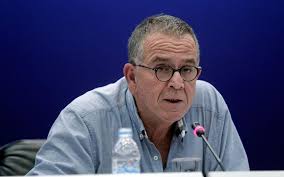By Dow Jones Business News
Greece’s migration minister has rejected accusations by Germany and other European countries that Greece is failing to defend its borders against mass migration, insisting that the refugees and other migrants trekking to Europe constitute a humanitarian crisis, not a defense threat.
“Greece can guard its borders perfectly and has been doing so for thousands of years, but against its enemies. The refugees are not our enemies,” Yiannis Mouzalas said in an interview.
Greece is under pressure from other European governments to use its coast guard and navy to control the huge influx of migrants who are making their way, via the Aegean Sea and Greece’s territory, from the Middle East to Northern Europe, especially Germany.
At a European summit in Brussels on Sunday, leaders from Greece and other countries on the latest migration route through the Balkans are facing allegations from Germany, Hungary and others that they are passively allowing migrants to pass through.
“In practice what lies behind the accusation is the desire to repel the migrants,” said Mr. Mouzalas. “Our job when they are in our territorial sea is to rescue them, not [let them] drown or repel them.”
Countries in Southern and Central Europe have been struggling to cope with the arrival of more than half a million people this year, with the largest number reaching Europe via Turkey and Greece.
Many are from war-torn Syria and are treated as refugees from mortal danger, while others come from as far as Pakistan and are seen as having weaker claims to asylum in Europe.
Last week alone, Greece received about 48,000 migrants and refugees on its shores, the highest number of weekly arrivals this year, the International Organization for Migration said Friday.
European Union authorities want countries along the transit route to agree on a plan to stop allowing people through, to fingerprint everyone who enters their territory, to beef up border surveillance in Greece, and to deploy 400 border guards to Slovenia, the latest hot spot.
Athens opposes an idea floated by European Commission President Jean-Claude Juncker to set up joint Turkish-Greek border patrols. Greece and Turkey have long-standing disputes over their territorial waters, which have led to military tension over the years.
“This was an unfortunate statement by Mr. Juncker,” Mr. Mouzalas said. “The joint patrols have never been on the table. They have no point anyway, as they wouldn’t help ease the situation.”
He said an alternative could be to set up a European body to patrol Turkish waters, closer to where many migrants begin their trip, to stem the flow of people attempting the perilous journey to the Greek islands.
Mr. Mouzalas said Turkey should have been invited to Sunday’s summit.
“Turkey is the door and Greece is the corridor; Europe should not treat Greece as the door,” Mr. Mouzalas said.
Greece argues that resettling Syrian refugees around Europe directly from camps in Turkey, Jordan or Lebanon, where millions of people have found temporary shelter, could ease the migration crisis.
“One has to recognize and praise Turkey for the fact that it has three to four million refugees on its territory,” Mr. Mouzalas said, adding that the EU should give Turkey the necessary funds and incentives to help with a resettlement plan.
EU Migration Commissioner Dimitris Avramopoulos has said he would present a resettlement plan early next year.
“Resettlement is the required and the most appropriate solution,” Mr. Mouzalas said. “But Europe is responding slowly to the problem.”
A gynecologist and founding member of the Greek branch of the aid agency Doctors of the World in 1990, Mr. Mouzalas has a long history of humanitarian work, especially in Africa and Asia.
After becoming minister in August in a caretaker government, he sought to ease the severe overcrowding on the islands of Kos and Lesbos by sending more administrative resources to process refugees. The left-wing Syriza party, which won Greece’s September elections, kept the politically nonaffiliated Mr. Mouzalas on.
He said the refugee crisis has already transformed Europe. “Europe’s reaction was a pleasant surprise. Up to now it was a fortress-and-jail continent, but now its majority says it is a continent of hospitality, which is trying to find the proper way to deal with the issue.”
Last month, after vitriolic debate, EU governments approved the redistribution of 160,000 asylum seekers across the bloc. But so far, only 105 refugees have been relocated, while Greece is expected to carry out its first relocation in the coming weeks.
So far, nine countries have offered to take in 854 refugees under the relocation plan, Natasha Bertaud, a spokeswoman for the European Commission, said Friday.
European authorities are also finding it hard to convince migrants to remain where they are placed. Most want to reach Germany or Scandinavia, but tens of thousands are earmarked for other countries.
Some countries, especially in Eastern Europe, have expressed reluctance to take in Muslim migrants, fearing they would be difficult to integrate.
“This is not supposed to be a human market,” Mr. Mouzalas says. “We cannot accept one country saying ‘I want 30 Christians’ and another one saying ‘I need 30 tall and blond people.’ “
He said Europe has to provide the refugees with “a country that is safe, but they can’t choose which country this will be.”
Greece, struggling with a long-running debt crisis, is in negotiations with its European creditors to exclude money it spends on migrants from the calculation of its budget deficit.
According to Mr. Mouzalas, the country has spent €1.5 billion ($1.65 billion) on the migration crisis during the past 18 months. It is also requesting some €500 million of extra EU funds to help it deal with the crisis, excluding the costs for the relocation program.
The country is already operating a reception center in Lesbos, where half of the migrants who enter Greece first land. Another four centers are expected to be ready on other islands by early December.









